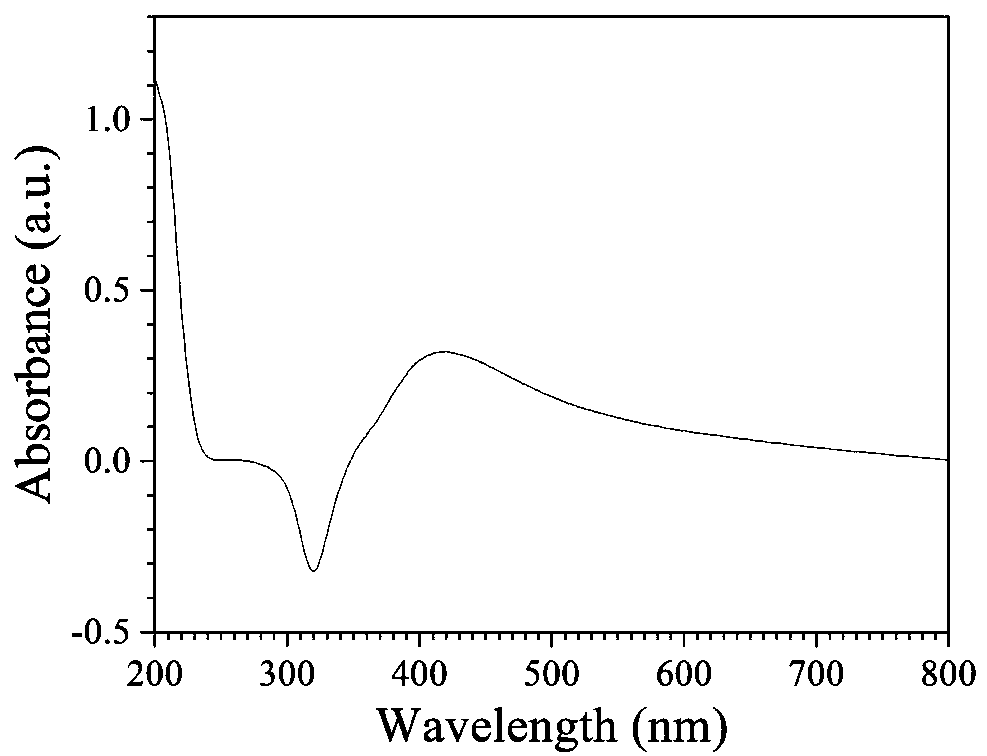Preparation method of nano-silver SERS probe for TNT detection
A nano-silver and probe technology, which is applied in the field of preparation of nano-silver SERS probes, can solve problems such as difficult analysis results and pollution, and achieve the effects of easy analysis results, increased inelastic scattering probability, and reliable structure
- Summary
- Abstract
- Description
- Claims
- Application Information
AI Technical Summary
Problems solved by technology
Method used
Image
Examples
preparation example Construction
[0050] A method for preparing a nano-silver SERS probe for TNT detection, characterized in that: the SERS probe is a double-layered silver nanorod that is self-assembled through adhesive coupling, and the adhesive molecules between the layers The electron-rich amino groups in the TNT molecules interact electrostatically with the three electron-deficient nitro groups in the TNT molecules, making the TNT molecules adhere to the surface of the double-layered silver nanorods. Using the localized surface plasmon resonance field on the metal surface, the TNT The conventional Raman signal of the molecule is enhanced to realize the detection of TNT. The preparation process of the above invention includes the following two steps:
[0051] The first step is the preparation of silver nanorods: first, the concentration of 0.04 ~ 0.06 mol L -1 silver ammonia solution, 1 ~ 3g / L dispersant solution and 0.004 ~ 0.006mol L -1 Surfactant solution, then take 5 ~ 10mL, 3 ~ 5mL and 1 ~ 3mL of the...
specific Embodiment
[0053]A method for preparing a nano-silver SERS probe for TNT detection, characterized in that: the SERS probe is a double-layered silver nanorod that is self-assembled through adhesive coupling, and the adhesive molecules between the layers The electron-rich amino groups in the TNT molecules interact electrostatically with the three electron-deficient nitro groups in the TNT molecules, making the TNT molecules adhere to the surface of the double-layered silver nanorods. Using the localized surface plasmon resonance field on the metal surface, the TNT The conventional Raman signal of the molecule is enhanced to achieve highly sensitive detection of trace amounts of TNT. The preparation process of the present invention comprises following two steps:
[0054] The first is the preparation of the solution: prepare a test tube washed with a low-concentration sodium hydroxide solution, accurately weigh 1.6987g of silver nitrate and place it in the test tube, add an appropriate amoun...
PUM
| Property | Measurement | Unit |
|---|---|---|
| particle diameter | aaaaa | aaaaa |
Abstract
Description
Claims
Application Information
 Login to View More
Login to View More - R&D
- Intellectual Property
- Life Sciences
- Materials
- Tech Scout
- Unparalleled Data Quality
- Higher Quality Content
- 60% Fewer Hallucinations
Browse by: Latest US Patents, China's latest patents, Technical Efficacy Thesaurus, Application Domain, Technology Topic, Popular Technical Reports.
© 2025 PatSnap. All rights reserved.Legal|Privacy policy|Modern Slavery Act Transparency Statement|Sitemap|About US| Contact US: help@patsnap.com



